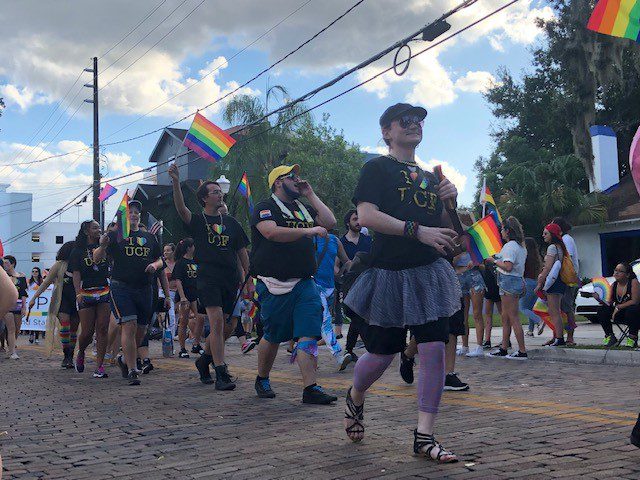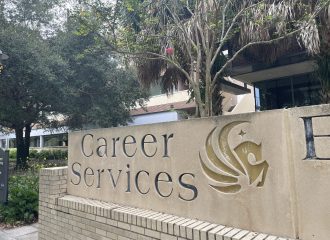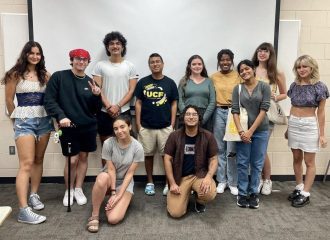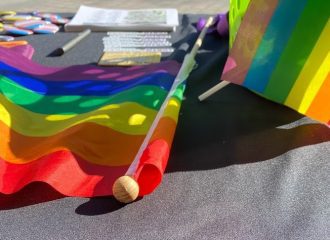by Alexis Stanley
UCF is home to a vibrant LGBTQ+ community, with people of all kinds and all backgrounds working towards different goals. Walking through campus, it’s hard not to see the Pride pins, Gender-Roll shirts, and rainbow accessories that so many of our students wear proudly.
UCF has been listed in the top 50 Queer-friendly schools in America by Campus Pride, a national nonprofit working to increase safety for LGBTQ+ students on college campuses; and we were the only Florida-based school to be chosen. More recently, UCF was also listed as the top college for LGBTQ+ students in Florida on the Campus Pride Index, created by BestColleges.com.
With the wide array of resources UCF provides to its LGBTQ+ students, it’s not hard to see why this school is so attractive to prospective queer students. However, despite all the attention the community gets from UCF—coming-out workshops, gender identity talks, curriculums, career and community resources— we hardly ever hear the real stories behind the people who come to this university. Who are they? Why did they come here? What have their experiences been like while at UCF?
UCF offers one of the broadest pools of resources for LGBTQ+ students and teachers alike as a university, and there’s something out there for every color of the rainbow! Hoping for some new friends and a good time? With the Lavender Council and the Multicultural Student Center putting together graduation and get-together events throughout each semester, you’ll always have an easy time connecting with other members of the community! Need somewhere quiet and safe to study? Go to Pride Commons, a chill study space on campus made just for you! Looking for some academic, career-based or personal help? LGBT Services and Counseling and Psychological Services has got your back!
One important resource available to students is the Alliance Mentoring Program, which connects queer students to queer staff to help them navigate the new world of college, academics, and careers. I spoke with Kristen Rodriguez, a bisexual cisgender woman and a member of the Lavender Council, about her experiences with this program.
Rodriguez admits that she had “never been very ‘out’” before coming to UCF, but that she’d had friends tell her about the community and culture here at UCF, stating that while “it wasn’t my main reason for attending, it was something I was very excited I would be able to do here!”
After joining the Lavender Council, Rodriguez heard about the program through her work with LGBTQ+ Services. “I decided to join because I was excited about the idea of working with someone who would be able to help me accomplish my academic and professional goals while also being understanding of the intersectionality of someone who’s in the community, a minority, a woman; and,” she adds in reference to her Political Science major, “going into a field dominated by none of those things.”
“I think that it allows me to connect with someone who has been in the position that I’m in right now. Connecting with someone who has gone through the whole process of college, going into the work force or seeking higher education and made it out on the other side is very helpful. It does a lot to give perspective on things,” Rodriguez says. “Going to college is hard for everyone, there’s so much going on and so much to keep track of, and it’s only harder when you’re an LGBTQ+ person who’s ‘out’ for the first time.”
“Processing everything in your personal life is hard enough,” she adds, “and adding the academic and professional aspect of it all it can be really overwhelming; and I think this program, along with all the other resources UCF has to offer its LGBTQ+ Students, can really make all the difference for students … It gives you a space to be open about everything all at once, rather than just in pieces, and gives you the opportunity to learn from someone who has been through it all.”
When asked if she thinks this type of program— LGBTQ+ driven, especially— should be employed in other universities and schools, Rodriguez replies, “I do! The program allows LGBTQ+ students to connect with people who also identify as LGBTQ+ or allies of the community! So I think it gives students a higher level of comfort to know that there’s more of a guarantee that the person they’ll be paired with will have an understanding of what they’re experiencing.”
With her work in the Lavender Council and with LGBTQ+ Services, Rodriguez is definitely familiar with how much programs like these can help other students, and praises UCF for the work it does to make sure these resources are readily available.
“I have the privilege of being very passing with my identity and having a very positive and accepting experience, so I haven’t needed to rely on some of the resources that are beneficial for people who might not have that same experience,” she says. “I think that there’s always more we can do to make sure we’re filling any gap we can find and make everyone’s experience in college as easy as we can. It’s a difficult time for everyone, and what we want to do is try to ease the added difficulties that can come with being LGBTQ+, and allow people to feel comfortable and accepted so they can focus on their education and be their authentic selves.”
Outside of university-led programs, there are also several clubs and organizations focused on the queer community here at UCF, like the Pride Student or Pride Faculty & Staff Associations, who run meet-ups year-round and organize student involvement in events such as Orlando Come Out With Pride.
I interviewed Rey Gonzalez, the Secretary of the Pride Student Alliance, who took time out of his busy schedule to speak with me as LGBTQ+ History month wound down. Gonzalez is a pansexual and cisgender individual who works hard to keep the PSA here at UCF up and running.
“I didn’t realize UCF was so queer-positive when it was first under my radar; however, once I found out all of the resources that they provided it really gave me that extra push to really try to get into UCF,” he says. “A lot of the friends that I have are in the LGBTQ+ Community, and I have had some amazing experiences because of it, such as meeting my boyfriend and having the friendships that I have now.”
Curious about his work at the PSA, I went on to ask what exactly the organization was and did, as well as what his role was as an Officer in the club. I’ve attended a few of these meetings and events myself, but speaking with an Officer reveals a different perspective on what working in the group actually entails.
“The Pride Student Association is a student-led club on campus that is promoting diversity and acceptance, as well as to provide a safe space for the LGBTQ+ Community. We offer members a place to meet others and also allow their voices to be heard,” he explains. “I decided to become the secretary for PSA because I felt as though I would be able to help the organization really shine. The club offers me a place to meet a variety of people and to make their days better.”
As the Secretary, Gonzalez primarily manages the newsletter, point system, and Knight-Thon committee for PSA. “However,” he adds, “the officers for PSA are really passionate about helping each other out whenever needed, so I could help out with anything else.”
When asked about the impact PSA makes on the queer community at UCF, Gonzalez delves into the personal effect it’s had on so many students.
“The biggest impact I think PSA has is community. For many first-year college students, it can be really hard to find where you fit in, and I believe that we offer a space that helps people find their niche,” he says. “I believe that other universities should really consider creating these kinds of groups and programs. There are people in the LGBTQ+ Community everywhere, and universities should strive to make their students feel included. We are people as well, and our voices matter.”
I asked both students what their suggestions were for future queer college students who might be looking at UCF as a potential school and seeing everything it has to offer them as a member of the LGBTQ+ community.
“There’s so many resources available when looking for colleges!” she says enthusiastically, mentioning the Campus Pride Index (and our high rank from 2019!), and states that the most important thing you can do is to do your research on any potential institution you want to join. “Google is your friend!” she advises. “Look up what resources they offer to LGBTQ+ students; is there a resource center or services office? Do they have student groups? Reach out to students/staff/faculty and see what they can tell you about the culture and how inclusive it is!”
“I would say that each person’s needs and wants from a school are very different,” Rey says simply. “But if you are a person who is looking for a school that provides a lot of resources to its students and makes sure that they are safe, UCF should be very high on your list.”
The University of Central Florida has no shortage of Queer resources, nor does it have any shortage of kind, individual members of the community. I’ve had the privilege of experiencing this community first-hand, and meeting so many amazing people, and it makes me proud to be a Knight—UCF and its students take care of its LGBTQ+ community, and that puts it scores above what many other colleges are only trying to accomplish. So if you’re a queer student here at UCF, or just researching potential colleges, it’s worth looking into what UCF—and its community—can do for you!
If you’re looking to take advantage of any of the many resources available on campus, check with LGBTQ+ Services, or check here for more information!
Defintions of terms used:
- https://www.hrc.org/explore/topic/bisexual – “bisexual”
- www.transstudent.org/definitions – “cisgender”
- https://www.glaad.org/blog/what-pansexuality-4-pan-celebs-explain-their-own-words – “pansexual”
- https://sja.sdes.ucf.edu/lgbtq/ – “here”






